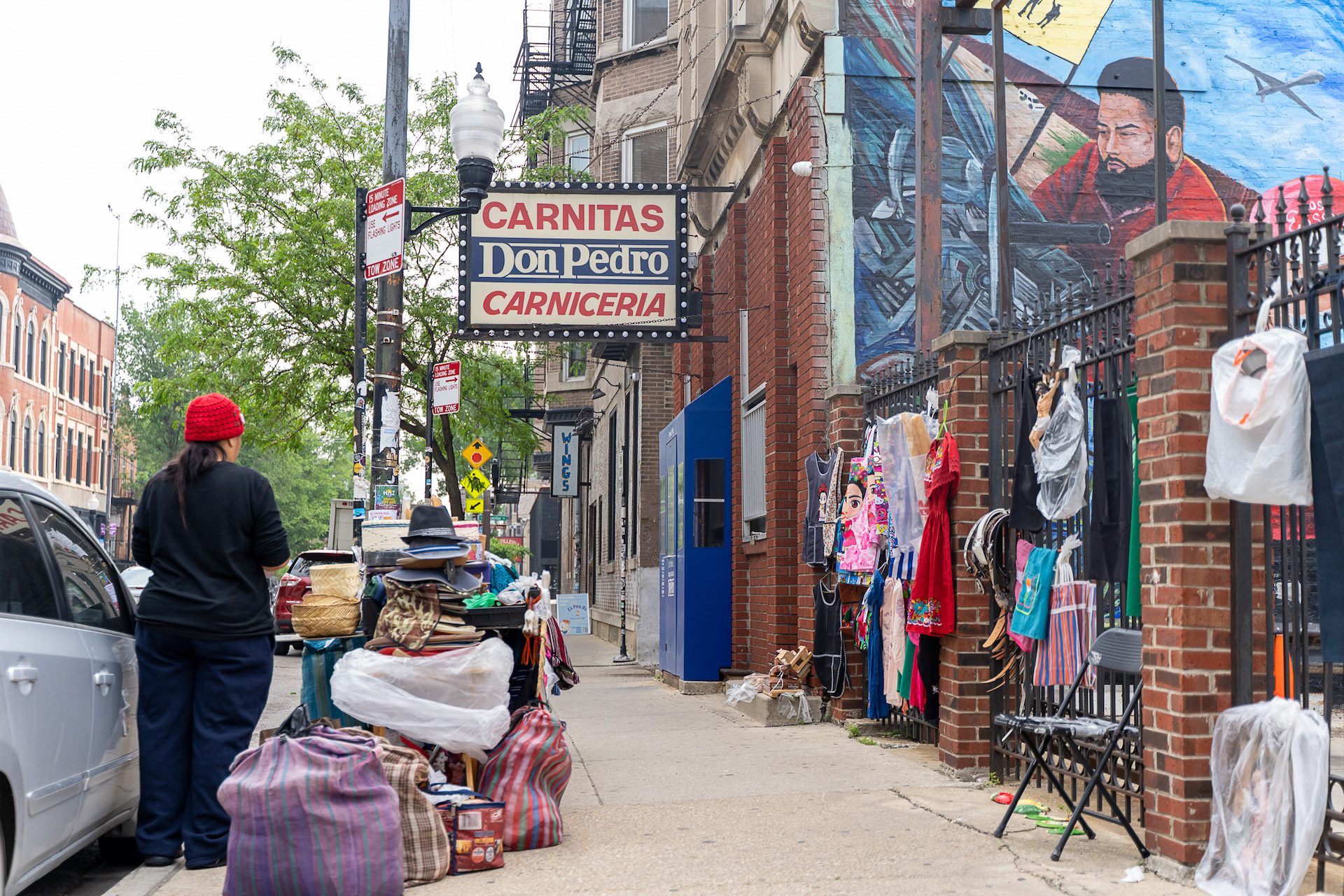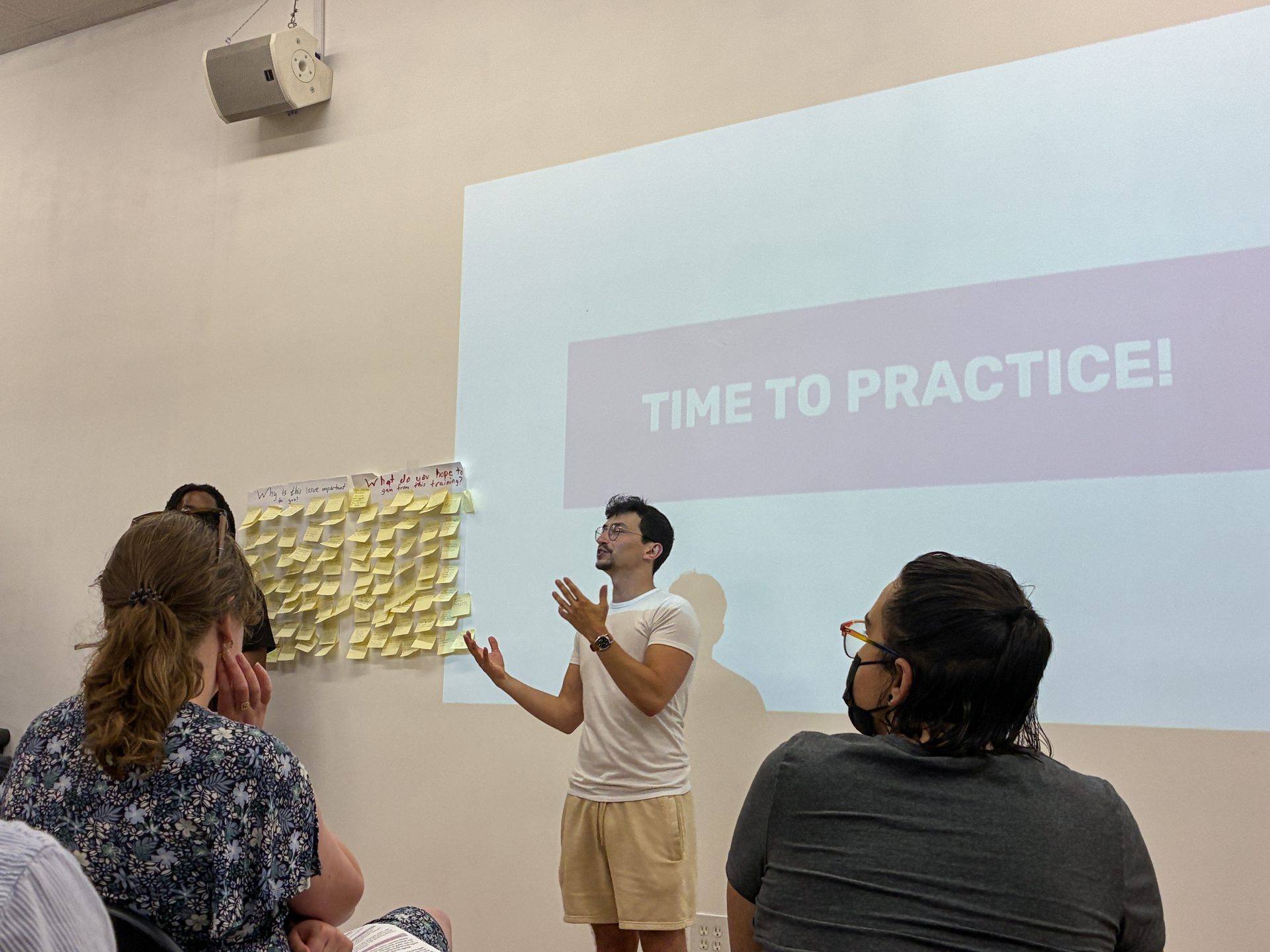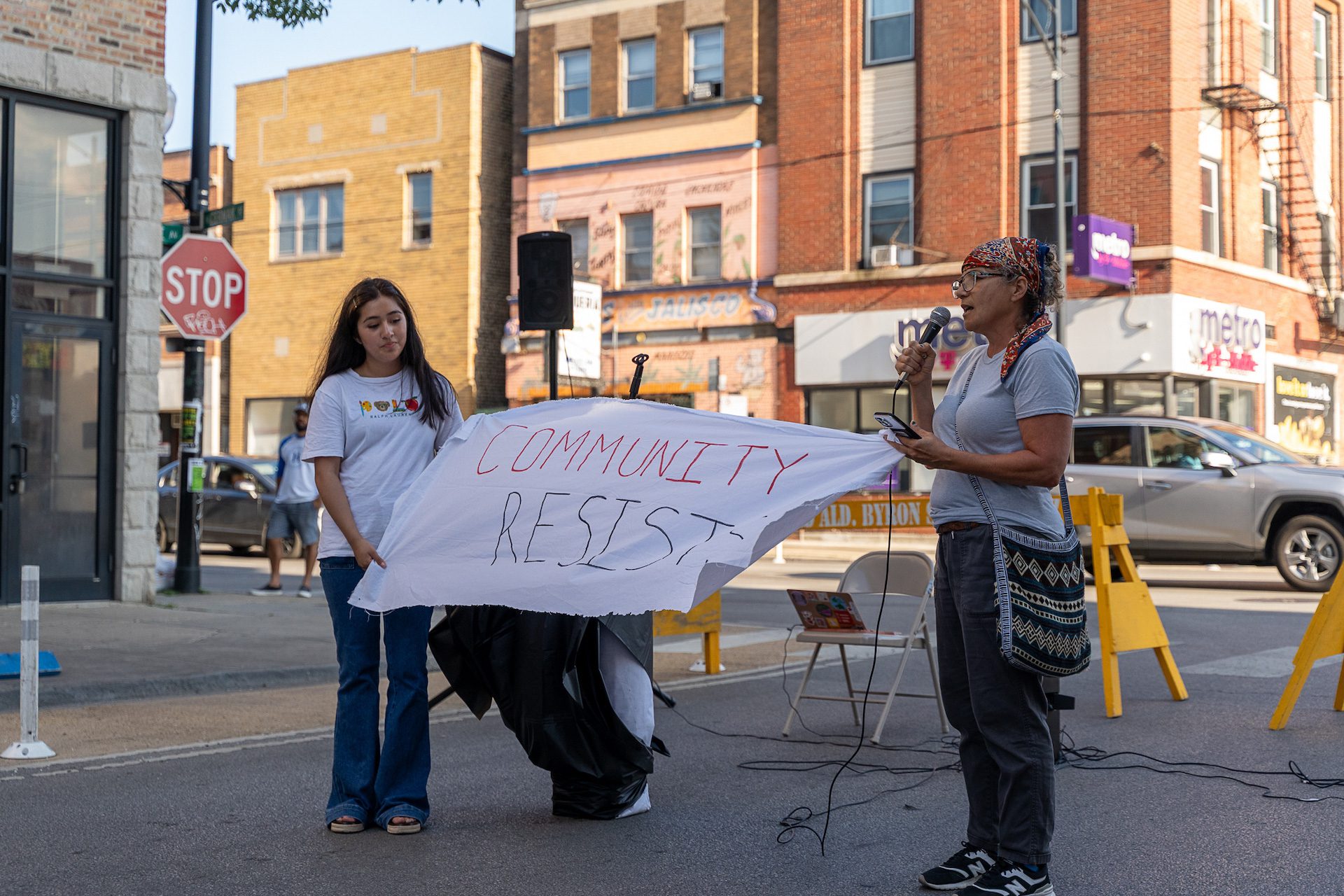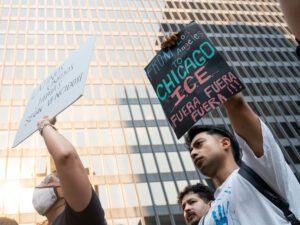 Lucy Baptiste/Borderless Magazine
Lucy Baptiste/Borderless MagazineA raid at Don Pedro Carnitas shook the Pilsen community. Now, local organizers are bolstering rapid response teams, legal aid and Know Your Rights training to keep families safe.
The scent of carnitas lingered in the air, but the kitchen at Don Pedro Carnitas was quieter than usual.
Days earlier, ICE agents had forced their way into the small Pilsen restaurant, chasing a worker through the front door without a warrant. He ran for safety inside the carnitas restaurant, but was followed inside by agents and detained along with another employee.
Now, restaurant staff move with caution — still showing up to work, still cooking, but always watching the door.
News that puts power under the spotlight and communities at the center.
Sign up for our free newsletter and get updates twice a week.
One worker, who asked to remain anonymous out of fear, said they’re doing their best to stay alert and look out for one another, even with the uncertainty of what might happen next.
“We try to stay alert so we can help each other and the people around us,” the worker said. “Our bosses protect us and care about us a lot, so we always try to give our best, even without knowing what may happen next.”
In recent months, Immigration and Customs Enforcement (ICE) ramped up enforcement in Democratic-led cities, including Chicago, Los Angeles and New York. Masked federal agents detained immigrants in neighborhoods, restaurants, inside courtrooms and homes. Trump’s aggressive enforcement actions have sent fear reverberating across immigrant neighborhoods, prompting nationwide protests and widespread condemnation.
Chicago Mayor Brandon Johnson called the federal actions part of a broader assault on civil rights. “This is a war on democracy,” Johnson said.
He urged Chicagoans to “resist” because “whatever particular vulnerable group is being targeted today, another group will be next…None of us are immune from this disease,” the Sun-Times reported.
Amid the federal government’s aggressive tactics, elected officials, faith-based organizations, and local immigrant rights groups have continued hosting Know Your Rights trainings and mobilizing Rapid Response teams in neighborhoods like Pilsen. They track ICE activity, support families, protect people at risk of deportation and issue warnings when ICE is around.
Diego Morales, chair of the 25th Ward Independent Political Organization and organizer with the Pilsen Rapid Response Network, has been working with coalition partners across Chicago to coordinate rapid response efforts. The network, also known as Puño, Pilsen Unidos por Nuestro Orgullo, is the frontline defense against ICE’s presence in immigrant neighborhoods, he said.
The response goes beyond simply showing up when agents appear. Morales emphasized the need to educate residents on their rights, including the legal limits of ICE’s power.
“Rapid response is basically all the ways that the community creates support for itself and defends itself against ICE,” Morales said. “It’s a collaborative effort rooted in Chicago’s long tradition of organizing.”

Following the arrest during a check-in at an immigration facility in Chicago, advocates and elected officials gathered outside suburban Broadview detention center last month to denounce what they called “militarized raids” targeting working-class neighborhoods.
U.S. Rep. Jesus “Chuy” Garcia was denied entry to the Broadview detention facility, and called the access denial “deeply troubling.”
“Our communities deserve transparency, dignity, and due process, not fear and confusion,” he said.
Advocates have seen a noticeable change in activities in immigrant communities — fewer shoppers in busy corridors or a decrease in students at neighborhood schools.
As immigration raids continue, groups like the Illinois Coalition for Immigrant and Refugee Rights (ICIRR) and Organized Communities Against Deportation (OCAD) have created a statewide rapid response network. Like the local efforts, these groups track ICE activity, verify reports and support impacted families.
Read More of Our Coverage
In Pilsen, these rapid response efforts are rooted in collaboration between long-standing local organizers and newer coalitions formed amid ICE raids.
Advocates said this work relies on collaboration across faith leaders, educators, wellness groups and volunteers willing to put their bodies on the line.
“Pilsen has one of the most active rapid response networks I’ve seen,” said Yesenia Puebla, a member of the Chicago Liberation Center. She called Pilsen’s Rapid Response efforts proactive instead of reactive. “People go out and search for ICE activity. They drive around, monitor social media, and knock on doors. It’s how we keep ourselves safe.”
These groups have been sharing Know Your Rights information at block parties and protests to educate neighbors about available resources. Volunteers stay alert through social media and neighborhood watch efforts to respond quickly when ICE is spotted, she said.

“Even if you have a precarious citizenship status, there are still ways to stay connected. There are still resources we can give one another,” Puebla said.
Nationwide, researchers have raised alarms about Trump’s immigration enforcement actions.
University of Chicago Professor Angela Garcia, who studies immigration policy, said the Trump administration’s immigration enforcement has become more unpredictable because it no longer focuses on specific targets, like people with serious criminal records. Instead, anyone without legal status can be detained, which has created widespread fear in immigrant communities.
“The pool of people vulnerable to enforcement has expanded,” Garcia said. “There’s a big lack of predictability and that instability serves the purpose of enforcement.”
She noted that tactics like detaining individuals immediately after their immigration court hearings, even when their cases are dismissed, are legal but deeply troubling.
“Courthouses are now becoming places of fear, not justice,” she said.
In the face of unpredictable strategy with such ICE enforcement, rapid response networks, she emphasized, are essential.
“These teams are rooted in deep community knowledge and mutual care,” Garcia said. “In a city like Chicago, with a long history of organizing, they play a critical role.”
Nino Brown, an organizer with the Chicago Liberation Center and Puño, echoed Garcia’s sentiments.
“The fear is real, but so is the power of organized community,” they said. “We knock on doors, train neighbors, prepare our people before ICE shows up. And when they do show up, we’re ready.”
“Our movement works because everyone contributes,” they said. “Some bring legal knowledge, some bring food, some just show up. That’s the only way we get through this.”
Lucy Baptiste is a Borderless reporting intern. She can be reached at [email protected].


